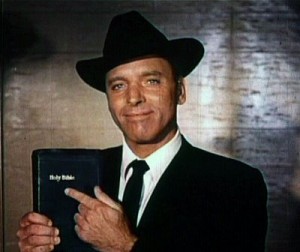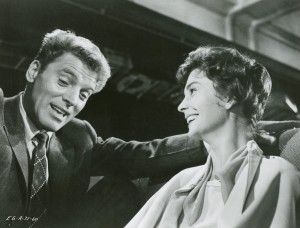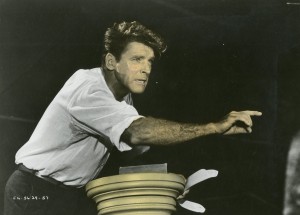by Barb Lentz
The five movies Bob provided for me from which to choose were these:
The Americanization of Emily (1964)
Elmer Gantry (1960)
The Guns of Navarone (1961)
The Naked Spur (1953)
Out of the Past (1947)
I chose Elmer Gantry as our second classic of 2014 as I don’t recall seeing any other Burt Lancaster films. He won an Oscar for his performance, and this was quite different from The Naked City.

The story is about revival meetings, and how people react. It focuses a bit on religion, but really more on morality. It also shows how people can be swayed by a crowd, one minute being supportive and the next being destructive. Elmer seems to be in love with Sister Sharon Falconer, and he helps her revivals. They have a similar background, but Sharon truly conveys that she is a believer. Elmer, well, you cannot tell. Sharon’s dream of building a tabernacle for her revivals is realized, but it does not end happily, as her dream burns to the ground with a carelessly tossed cigarette. This occurs after she heals someone who is deaf. Everyone gets in line for healihg, rather than listen to her sermon. This parade is only interrupted by the fire. Sharon cannot believe that her dream and her honor to God are being destroyed. She burns with her dream. The next day Elmer declares that he is putting away childish things and goes on his way.
Lulu’s father, a deacon, does not exhibit Christianity, throwing Lulu out of the house when he discovers her and Elmer together. Further, he sends her a Christmas card telling her that dogs eat Jezebels. Lulu asks why some people can only find hate in the Bible. Lulu’s father has clearly judged her, which you are not supposed to do either. Some people use religion as an justification for things they believe, as you can interpret text many different ways.
My top five moments of the movie are:

1. When Burt Lancaster sings, early and late in the movie. He has a nice clear, strong singing voice.
2. When music is used to deepen the story without becoming a musical, such as when the hymn “Onward Christian Soldiers” is played as jazz during the riot scene.
3. When Elmer Gantry shows his serious side, displaying humility and forgiveness, especially in his final scene with Lulu Bains.
4. When the newspaper writer, Jim Lefferts, provides insight into what makes Elmer tick. Elmer also surprises Jim, challenging his negative story and forcing the newspaper publisher to furnish them with equal time on the radio.
5. When Lulu invites Elmer to her apartment and confronts him about the past, which finally settles the score between them.

Is this a classic? Yes, I think so. People still act in ways shown in the film. It does not seem dated in that way, even though such tent revivals are largely a thing of the past. The acting is tremendous from all four leads — Burt Lancaster, Jean Simmons, Arthur Kennedy and Shirley Jones. I don’t understand why Sharon Falconer didn’t run from the fire like everyone else, but that provided a clean ending for the story. I wasn’t offended by the knocks against evangelism, and the story kept my interest throughout. My favorite character was Jim Lefferts because he kept everything in perspective.
BRL 22 January 2014.
Elmer Gantry (June 29, 1960) Elmer Gantry Productions / United Artists.
Directed by Richard Brooks. Produced by Bernard Smith.
Screenplay by Richard Brooks, from the novel by Sinclair Lewis.
Principal Cast (character, performer):
Elmer Gantry Burt Lancaster
Sister Sharon Falconer Jean Simmons
Jim Lefferts Arthur Kennedy
William “Bill” Morgan Dean Jagger
Lulu Bains Shirley Jones
Sister Rachel Patti Page
George F. Babbitt Edward Andrews
Reverend John Pengilly John McIntire
Reverend Philip Garrison Hugh Marlowe
Pete Joe Maross
146 minutes. Color. Widescreen (1.66:1). Not Rated.
